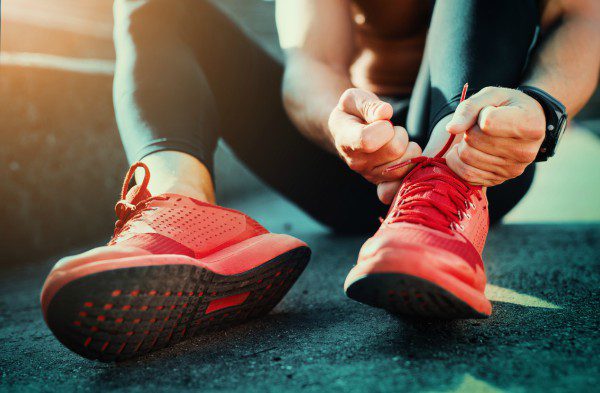Quitting substances is only the beginning of the journey in recovery. Staying clean after drug detox and rehab is the true test. Living independently, unsupervised, and confronted with countless temptations to go back to what’s all so familiar and comfortable will challenge your resolve. But an activity like running (or other similarly strenuous exercise) may be just the tool to help you succeed in recovery. In addition to helping take the focus off substance use, running can help actually rebuild your life, your body, and your control center — the brain.1
“… there’s definitely an effect in the interaction between physical activity and the way that we respond to drugs,” notes Nora Volkow, MD, Director of the National Institute on Drug Abuse, in a Runner’s World special report.2
Could Running Help You Sustain a Successful Recovery?
 Before you race to a decision to grab your sneakers, take a moment to discover the benefits.
Before you race to a decision to grab your sneakers, take a moment to discover the benefits.
1. Running produces a natural high. The human brain releases a chemical reward when you run. Dopamine, one of these chemicals, produces a feeling of pleasure. Research suggests that the natural high from running can be used as an alternative reward to the euphoria produced by drugs.1 This coping tactic — even in a modest amount — can help reverse your relapse vulnerability.2
2. Running releases painkilling endorphins. Endorphins are another chemical reward that comes with running — and don’t underestimate their power. Besides being an alternative, healthier method of pain relief, these neurochemicals can also boost pleasure, increase your sense of well-being, and, thereby, reduce stress and anxiety (building blocks to depression and addiction).3
3. Running helps the brain heal. Running can actually work to reduce the brain damage caused by drug abuse.4
4. Running improves clarity of thought.3 As cognitive function is restored, one of the first improvements you’ll likely notice from running is greater mental keenness.5
5. Running can be a positive addiction. Some researchers say that those who turn to running as a way to redirect their zeal are simply replacing one addiction with another. But compare the healthy benefits of running to the destructive impact of substance use disorders, and it’s no contest.5 Just make sure to keep your running in balance. After all, it’s possible to overdo even healthy habits.
6. Running can provide a healthy new support network. Getting clean often means avoiding places and people that could trigger a relapse. This can leave you without a lot of support as you try to figure out new ways to fill your free time. The good news is, many fellow runners are likely health-conscious people who could make great friends.5
7. Running can provide structure. Establishing a weekly schedule for running and other physical activity can give you an anchor for how to spend your free time now that drugs and alcohol aren’t part of the picture anymore.5
8. Running can help you develop self-discipline. The daily habits you develop as part of a running regimen can foster greater personal growth. This can apply to the realm of drugs and alcohol, as well as to your career, relationships and other important facets of life.3
9. Running can help regulate sleep. As your body adjusts to recovery, you might have trouble getting enough rest.5 In most cases, physical activity results in better sleep due to healthy fatigue.3
10. Running can change your outlook on life. Addiction might be said to communicate, “I don’t care about anything, even my own life.”5 But given the opportunity, running might prove to be your testimony to the exact opposite. A simple pair of running shoes can return momentum — even joy — to your life and support your growth into the genuine, caring human being you were made to be.2
“Part of my daily recovery routine included running. It became my place to reduce stress, and it strengthened my connection with myself and my higher power.”
11. Running can promote a sense of self-worth. Running can be a major accomplishment and point of pride.3 You can start telling your tale to the most important audience of all — yourself — and then to others who may be struggling with addiction.
12. Running cleanses and strengthens your body. It doesn’t take long to see the physical benefits of running, whether it’s improved stamina, weight loss or a healthier heart and lungs.3 Sure, you might experience some premature wear and tear on your joints if you run a lot. But if running can help you avoid all the negative — and even dangerous — health effects that come with drug or alcohol abuse, perhaps you’ll risk a bit of joint deterioration.4
13. Running can help build stronger character. Running is a great way to learn about your own abilities and limitations. So challenge yourself. Dare to live deeply. Care enough about your life to work hard in order to get better. It might just rock your world and how you view yourself.5
14. Running can improve your sense of control. You may find that regular running eases anxiety, stress, and depression.5 This can, in turn, leave you feeling in charge of your life again, no longer weighed down by the helplessness and frustration that often accompany addiction.3
Sources:
1. Fell, James. “Exercise: Alternative Reward for Those Battling Addiction.” Chicago Tribune, June 12, 2013.
2. Daniloff, Caleb. “The Runner’s High.” Runner’s World, Accessed October 27, 2017.
3. Rasa, Candice, LCSW. “Why Running Is Good for Addiction Recovery.” Competitor Running, June 29, 2017.
4. “Running Can Curb Addiction and Ease Recovery.” Runwell, The Linda Quirk Foundation, August 7, 2014.
5. Wilson, Jacque. “Replacing Addiction With a Healthy Obsession.” CNN, November 21, 2012.
By Thomas Tjornehoj
